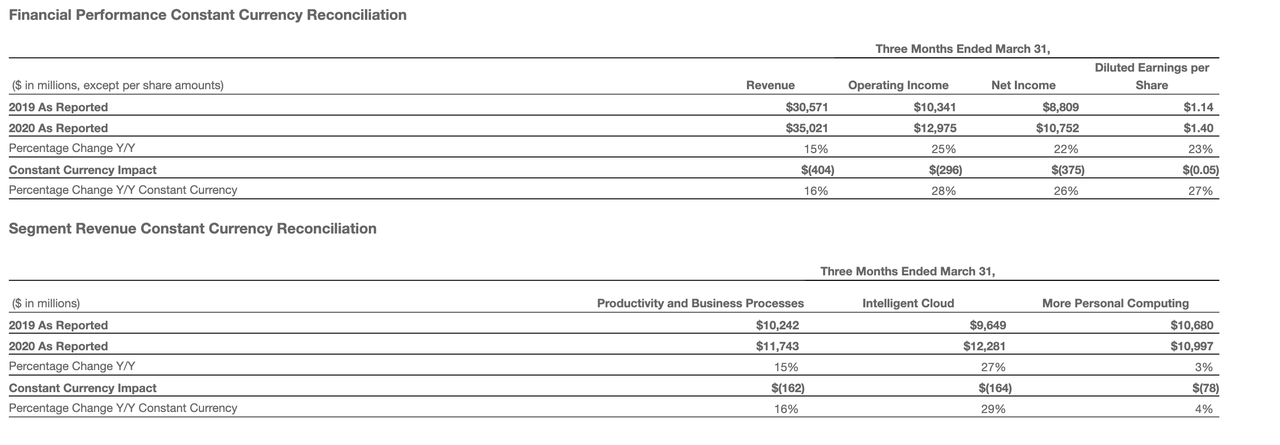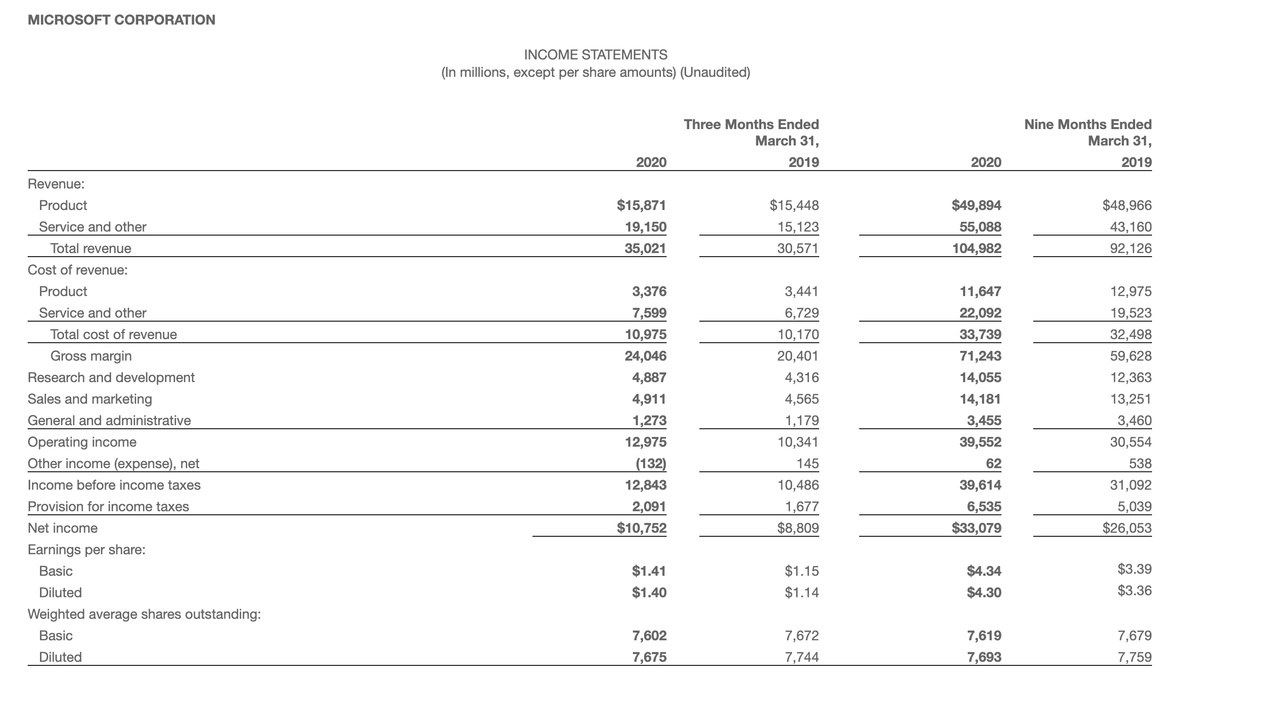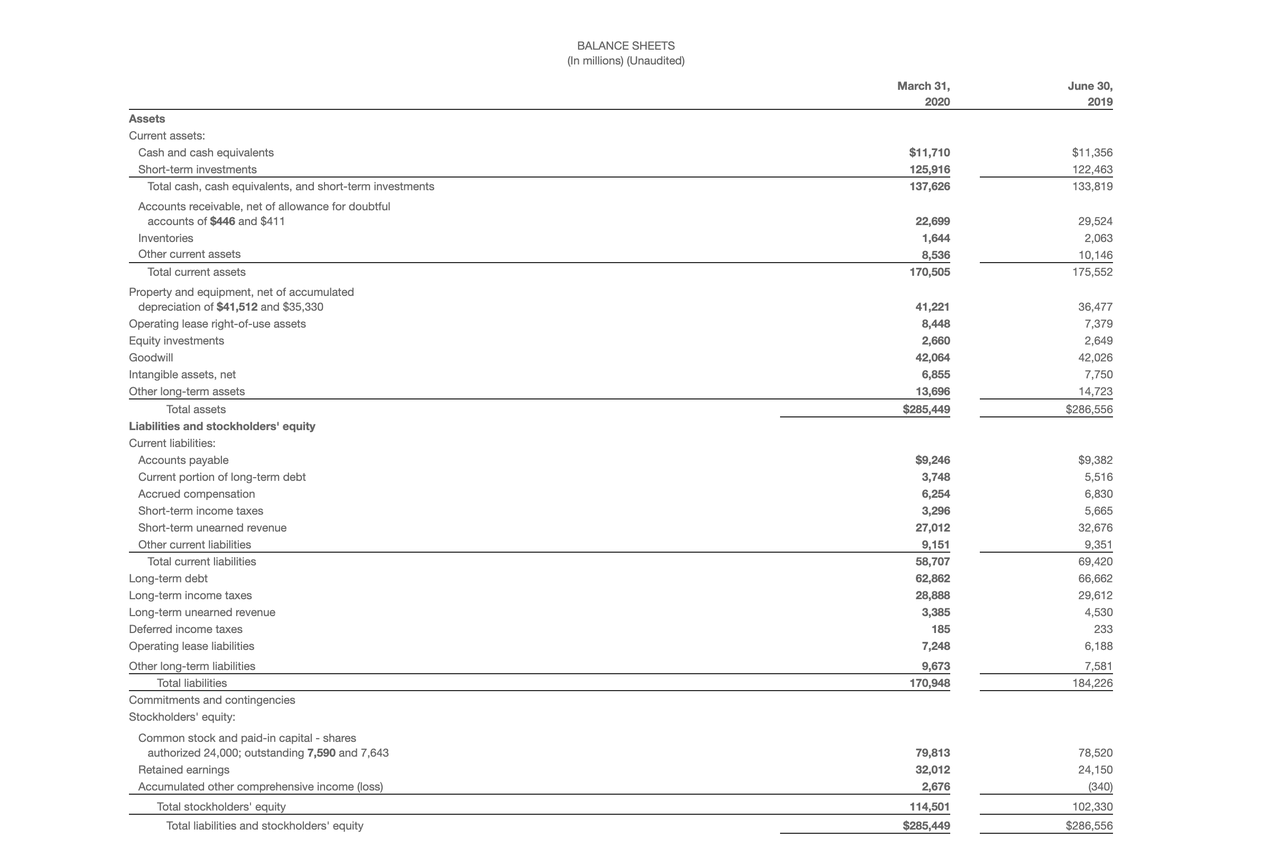Microsoft Rips On Massive Q3 Sales Beat, “Minimal Impact” From COVID-19
Adding to the flurry of optimistic earnings reports from the big-tech market leaders, Microsoft reported surprisingly strong EPS and sales Wednesday afternoon, beating the highest Street forecast reported by BBG (particularly in MSFT’s increasingly important cloud business) while revealing that COVID-19 had “minimal impact” on the company’s Q3 performance.
Specifically, MSFT reported revenue for the third quarter of $35.02 billion, a +15% jump y/y, vs. the consensus est. of $33.69 billion (with a range $32.75 billion to $34.77 billion).
Here’s a quick breakdown courtesy of BBG:
-
3Q EPS $1.40 vs. $1.14 y/y, estimate $1.28 (range $1.17 to $1.35)
-
3Q Productivity and Business Processes revenue $11.74 billion, +15% y/y, estimate $11.54 billion
-
3Q Intelligent Cloud revenue $12.28 billion, +27% y/y, estimate $11.67 billion
-
3Q More Personal Computing revenue $11.00 billion, +3% y/y, estimate $10.55 billion
-
3Q capital expenditure $3.77 billion, +47% y/y
-
Covid Had Minimal Net Impact on Total Co. Rev.
-
Cloud Usage Increased in Some Segments
-
MSFT Saw Slowdown in Transactional Licensing in Final Weeks
-
MSFT: More Personal Computing Benefited From Increased Demand
The blow to Microsoft’s business from the outbreak and ensuing economic downturn was blunted by increases in Internet usage as well as a spike in demand for hardware and software related to the great transition to WFH.
In the Productivity and Business Processes and Intelligent Cloud segments, cloud usage increased, particularly in Microsoft 365 including Teams, Azure, Windows Virtual Desktop, advanced security solutions, and Power Platform, as customers shifted to work and learn from home. In the final weeks of the quarter, there was a slowdown in transactional licensing, particularly in small and medium businesses, and a reduction in advertising spend in LinkedIn.
In the More Personal Computing segment, Windows OEM and Surface benefited from increased demand to support remote work and learn scenarios, offset in part by supply chain constraints in China that improved late in the quarter. Gaming benefited from increased engagement following stay-at-home guidelines. Search was negatively impacted by reductions in advertising spend, particularly in the industries most impacted by COVID-19. The effects of COVID-19 may not be fully reflected in the financial results until future periods.
MSFT’s gaming segment benefited as millions of Americans whiled away the hours playing video games, though MSFT said its search segment was impacted by the drop in demand for advertising.
MSFT stock ripped in after-hours trading:
Though the report didn’t go into too much detail, MSFT warned that “catastrophic events or geo-political conditions, such as the COVID-19 pandemic…may disrupt our business,” though it didn’t offer anything substantial to replace the guidance it walked back weeks ago.
Read the press release below:
REDMOND, Wash. — April 29, 2020 — Microsoft Corp. today announced the following results for the quarter ended March 31, 2020, as compared to the corresponding period of last fiscal year:
- Revenue was $35.0 billion and increased 15%
- Operating income was $13.0 billion and increased 25%
- Net income was $10.8 billion and increased 22%
- Diluted earnings per share was $1.40 and increased 23%
“We’ve seen two years’ worth of digital transformation in two months. From remote teamwork and learning, to sales and customer service, to critical cloud infrastructure and security – we are working alongside customers every day to help them adapt and stay open for business in a world of remote everything,” said Satya Nadella, chief executive officer of Microsoft. “Our durable business model, diversified portfolio, and differentiated technology stack position us well for what’s ahead.”
“In this dynamic environment, our sales teams and partners executed a solid third quarter, with Commercial Cloud revenue generating $13.3 billion, up 39% year over year,” said Amy Hood, executive vice president and chief financial officer of Microsoft. “We remain committed to balancing operational discipline with continued investments in key strategic areas to drive future growth.”
COVID-19 Impact
In the third quarter of fiscal year 2020, COVID-19 had minimal net impact on the total company revenue.
In the Productivity and Business Processes and Intelligent Cloud segments, cloud usage increased, particularly in Microsoft 365 including Teams, Azure, Windows Virtual Desktop, advanced security solutions, and Power Platform, as customers shifted to work and learn from home. In the final weeks of the quarter, there was a slowdown in transactional licensing, particularly in small and medium businesses, and a reduction in advertising spend in LinkedIn.
In the More Personal Computing segment, Windows OEM and Surface benefited from increased demand to support remote work and learn scenarios, offset in part by supply chain constraints in China that improved late in the quarter. Gaming benefited from increased engagement following stay-at-home guidelines. Search was negatively impacted by reductions in advertising spend, particularly in the industries most impacted by COVID-19. The effects of COVID-19 may not be fully reflected in the financial results until future periods.
Segment Highlights
Revenue in Productivity and Business Processes was $11.7 billion and increased 15% (up 16% in constant currency), with the following business highlights:
Office Commercial products and cloud services revenue increased 13% (up 15% in constant currency) driven by Office 365 Commercial revenue growth of 25% (up 27% in constant currency)
Office Consumer products and cloud services revenue increased 15% (up 17% in constant currency) with continued growth in Office 365 Consumer subscribers to 39.6 million
LinkedIn revenue increased 21% (up 22% in constant currency)
Dynamics products and cloud services revenue increased 17% (up 20% in constant currency) driven by Dynamics 365 revenue growth of 47% (up 49% in constant currency)
Revenue in Intelligent Cloud was $12.3 billion and increased 27% (up 29% in constant currency), with the following business highlights:
Server products and cloud services revenue increased 30% (up 32% in constant currency) driven by Azure revenue growth of 59% (up 61% in constant currency)
Enterprise Services revenue increased 6% (up 7% in constant currency)
Revenue in More Personal Computing was $11.0 billion and increased 3% (up 4% in constant currency), with the following business highlights:
Windows OEM revenue was relatively unchanged year over year
Windows Commercial products and cloud services revenue increased 17% (up 18% in constant currency)
Search advertising revenue excluding traffic acquisition costs increased 1%Xbox content and services revenue increased 2%
Surface revenue increased 1% (up 2% in constant currency)
Return to Shareholders
Microsoft returned $9.9 billion to shareholders in the form of share repurchases and dividends in the third quarter of fiscal year 2020, an increase of 33% compared to the third quarter of fiscal year 2019.
Business Outlook
Microsoft will provide forward-looking guidance in connection with this quarterly earnings announcement on its earnings conference call and webcast.
Responding to COVID-19
At Microsoft, our focus remains on ensuring the safety of our employees, striving to protect the health and well-being of the communities in which we operate, and providing technology and resources to our customers and partners to help them do their best work while remote. Additional information about Microsoft’s COVID-19 response can be found here.
Quarterly Product Releases and Enhancements
Every quarter Microsoft delivers hundreds of products, either as new releases, services, or enhancements to current products and services.
These releases are a result of significant research and development investments, made over multiple years, designed to help customers be more productive and secure and to deliver differentiated value across the cloud and the edge.
Here are the major product releases and other highlights for the quarter, organized by product categories, to help illustrate how we are accelerating innovation across our businesses while expanding our market opportunities.
Environmental, Social, and Governance (ESG)
To better execute on Microsoft’s mission, we focus our Environmental, Social, and Governance (ESG) efforts where we can have the most positive impact. To learn more about our latest initiatives and priorities, please visit our investor relations ESG website.
Webcast Details
Satya Nadella, chief executive officer, Amy Hood, executive vice president and chief financial officer, Frank Brod, chief accounting officer, Keith Dolliver, deputy general counsel, and Michael Spencer, general manager of investor relations, will host a conference call and webcast at 2:30 p.m. Pacific time (5:30 p.m. Eastern time) today to discuss details of the company’s performance for the quarter and certain forward-looking information. The session may be accessed at http://www.microsoft.com/en-us/investor. The webcast will be available for replay through the close of business on April 29, 2021.
Constant Currency
Microsoft presents constant currency information to provide a framework for assessing how our underlying businesses performed excluding the effect of foreign currency rate fluctuations. To present this information, current and comparative prior period results for entities reporting in currencies other than United States dollars are converted into United States dollars using the average exchange rates from the comparative period rather than the actual exchange rates in effect during the respective periods. All growth comparisons relate to the corresponding period in the last fiscal year. Microsoft has provided this non-GAAP financial information to aid investors in better understanding our performance. The non-GAAP financial measures presented in this release should not be considered as a substitute for, or superior to, the measures of financial performance prepared in accordance with generally accepted accounting principles (GAAP).
About Microsoft
Microsoft (Nasdaq “MSFT” @microsoft) enables digital transformation for the era of an intelligent cloud and an intelligent edge. Its mission is to empower every person and every organization on the planet to achieve more.
Forward-Looking Statements
Statements in this release that are “forward-looking statements” are based on current expectations and assumptions that are subject to risks and uncertainties. Actual results could differ materially because of factors such as:
- intense competition in all of our markets that may lead to lower revenue or operating margins;
- increasing focus on cloud-based services presenting execution and competitive risks;
- significant investments in products and services that may not achieve expected returns;
- acquisitions, joint ventures, and strategic alliances that may have an adverse effect on our business;
- impairment of goodwill or amortizable intangible assets causing a significant charge to earnings;
- cyberattacks and security vulnerabilities that could lead to reduced revenue, increased costs, liability claims, or harm to our reputation or competitive position;
- disclosure and misuse of personal data that could cause liability and harm to our reputation;
- the possibility that we may not be able to protect information stored in our products and services from use by others;
- abuse of our advertising or social platforms that may harm our reputation or user engagement;
- the development of the internet of things presenting security, privacy, and execution risks;
- issues about the use of artificial intelligence in our offerings that may result in competitive harm, legal liability, or reputational harm;
- excessive outages, data losses, and disruptions of our online services if we fail to maintain an adequate operations infrastructure;
- quality or supply problems;
- the possibility that we may fail to protect our source code;
- legal changes, our evolving business model, piracy, and other factors may decrease the value of our intellectual property;
- claims that Microsoft has infringed the intellectual property rights of others;
- claims against us that may result in adverse outcomes in legal disputes;
- government litigation and regulatory activity relating to competition rules that may limit how we design and market our products;
- potential liability under trade protection, anti-corruption, and other laws resulting from our global operations;
- laws and regulations relating to the handling of personal data that may impede the adoption of our services or result in increased costs, legal claims, fines, or reputational damage;
- additional tax liabilities;
- damage to our reputation or our brands that may harm our business and operating results;
- exposure to increased economic and operational uncertainties from operating a global business, including the effects of foreign currency exchange;
- uncertainties relating to our business with government customers;
- adverse economic or market conditions that may harm our business;
- catastrophic events or geo-political conditions, such as the COVID-19 pandemic, that may disrupt our business; and
- the dependence of our business on our ability to attract and retain talented employees.
* * *
For more information about risks and uncertainties associated with Microsoft’s business, please refer to the “Management’s Discussion and Analysis of Financial Condition and Results of Operations” and “Risk Factors” sections of Microsoft’s SEC filings, including, but not limited to, its annual report on Form 10-K and quarterly reports on Form 10-Q, copies of which may be obtained by contacting Microsoft’s Investor Relations department at (800) 285-7772 or at Microsoft’s Investor Relations website at http://www.microsoft.com/en-us/investor.
All information in this release is as of March 31, 2020. The company undertakes no duty to update any forward-looking statement to conform the statement to actual results or changes in the company’s expectations.
* * *
Source: Microsoft
Tyler Durden
Wed, 04/29/2020 – 16:19





